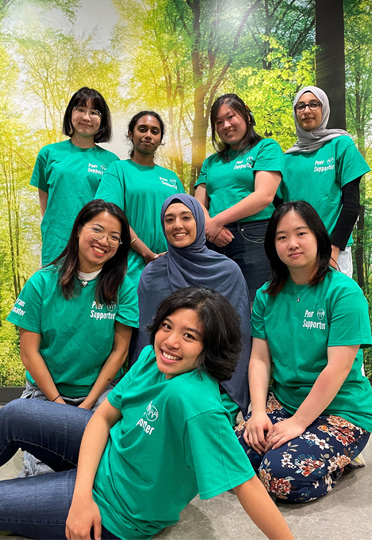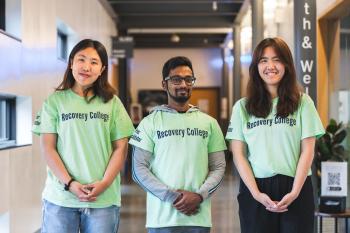Welcome to Resilient UTSC: 1-on-1 Peer Support and Co-designed Group Learning!

Peer Support is comprised of student Peer Supporters with lived experiences related to mental health and academic challenges. Trained by Hope + Me - Mood Disorders Association of Ontario and the Health & Wellness Centre, Peer Supporters organize and facilitate drop-in groups where fellow students discuss a variety of topics, including mental health, family/relationship dynamics, and academic experiences. For this upcoming academic year, students can also connect one-on-one with a Peer Supporter.
Please reach out to health.utsc@utoronto.ca if you are interested in connecting with a Peer Supporter during a drop-in group or individually. The Peer Support Program runs during the Fall and Winter semesters.
Drop In Hours: will resume in Fall 2024
Peer Support Frequently Asked Questions
Any University of Toronto student can attend a drop-in group. Here are some reasons students might want attend:
- seeking support with their mental health and academic needs
- prefer to talk to another student who may be able to relate to their lived experiences
- feeling isolated on campus and want to connect
- wanting to get better connected with services across campus
- seeking community
Our Peer Support Drop-In Group is facilitated by two trained Peer Supporters.
Our groups have the following components:
- Welcome. All students who attend are welcomed to the group space by the Peer Supporters.
- Introductions. Everyone attending will have an opportunity to introduction themselves and share their pronouns (optional).
- Comfort Agreement. At each group, attendees review the comfort agreement, which includes:
- Protecting confidentially
- Creating a judgment free zone
- Being mindful of inclusive language
- Active Listening
- Voluntary Participation
- Check-in. All students attending will have an opportunity to “check-in,” letting the group how they are doing, what’s on their mind, and what would be helpful for them in attending.
- Support & Resources. Our Peer Supporters engage participants in conversations that offer support and potential resources for any questions, challenges, or difficulties that may come up for students during group.
- Check-Out. Students will have the opportunity to reflect on the group experience at the end of group.
- Coping skills to help improve stress and reduce feels of being overwhelmed
- Strategies for managing mental health
- Suggestions for resources to better manage your academics
- Exploring your strengths as a student
- Strategies for relationship building with friends and family
- Feeling connected with other students on campus, managing loneliness
- Getting referrals to other resources and services across campus
Resilient UTSC (Recovery College)

Ontario Shores Centre for Mental Health Sciences is partnered University of Toronto Scarborough to host Resilient UTSC (Recovery College) for students at your campus. This model is a unique, free, virtual, mental health and well-being learning centre where people with lived experiences of navigating wellness through the post-secondary experience and peers come together to co-design and deliver courses on topics that support mental health and well-being. The courses are developed by UTSC students! Through structured curriculum, guided discussions, and activities, Resilient UTSC (Recovery College) offer the opportunity to empower yourself in the pursuit of well-being, on your terms. Please see details for courses offered below. For more information, please email Peer Support Specialist, Brooklyn Bastarache, bastaracheb@ontarioshores.ca . To register for any or all of the courses, please go to Resilient UTSC (Recovery College) Registration Summer 2024. Please note, courses are only open to UTSC students.
Resilient UTSC (Recovery College) Courses
Dates: Thursdays, June 20 - July 18
Time: 11:30am-12:30pm
Room: HL407
As many of us know, student life can be overwhelming and stressful, which is why it is important that we need to practice mindfulness and self-care every day! In this course, we will go through a journey of practicing mindfulness, meditation, and self-compassion. Through interactive sessions and experiential activities (e.g. outdoor learning at the Valley UTSC), students will explore the benefits of mindfulness, learn to cultivate self-care routines, deepen their gratitude and build personalized meditation toolkits. We will explore and develop essential skills for navigating life's challenges with resilience and kindness, fostering inner peace, and holistic well-being guided by research and practical insights.
What will you learn?
•Explore the benefits of meditation and the practical application of mindfulness
•Understand and develop strategies to integrate self-care and self-compassion into daily life
•Cultivate gratitude and compassion toward others while fostering a deeper connection with nature
•Engaged in guided meditation and collaboration to build a personalized mindfulness toolkit
Course Topics:
• Week 1: Intro to Meditation and Mindfulness
• Week 2: Self-care and Self-Compassion
• Week 3: The Nature of Gratitude
• Week 4: Guided Meditation
• Week 5: Building a Meditation/Mindfulness Toolkit
Date: Tuesdays, July 9 - August 6
Time: 11:30am - 12:30pm
Room: HL407
As an International Student, you are an expert in your own experience. If you are interested in informing mental health programming at your school, this is the course for you! You and your peers will come together to brainstorm ideas for courses to be offered in the Resilient UTSC (Recovery College) for International Students. You will collectively design and develop the course offerings for the next semester in this program. You will decide what the course topics are, how to engage with these topics, and the names of the courses. As International Students, you and your peers know your needs better than anyone else. We can’t wait to learn and create alongside you!
12 spots available, first come first serve.
What will you learn?
- About the personal recovery movement, co-design, and the recovery college philosophy
- To work as a member of a team to design relevant and impactful mental health and wellness courses
- To leverage your experiences navigating wellness as a post-secondary student as a source of strength and value
- To foster creativity in creating new and innovative courses that meet the needs of post-secondary students